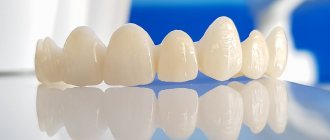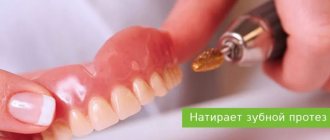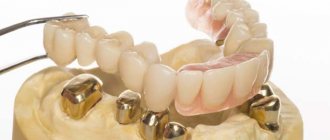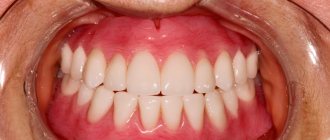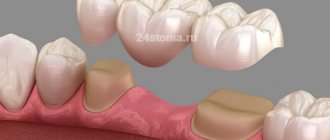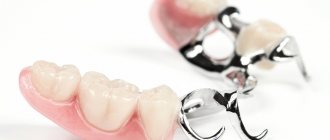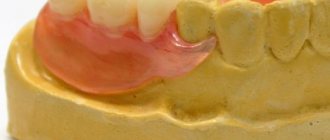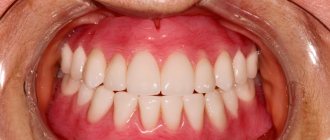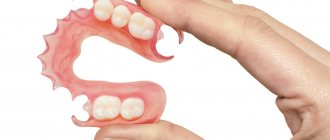Seal
Strong teeth not only provide an attractive smile, but are also the key to good health, since the health of the gastrointestinal tract and other organs of the digestive system depends on the quality of chewing food. But not every person can boast of healthy teeth. Often the integrity of the dentition is compromised due to oral diseases, injuries, age-related and other reasons.
The loss of just one tooth leads to negative consequences, including malocclusion, changes in the chewing surfaces of molars, bone tissue atrophy, etc. That is why it is recommended not to delay the installation of dentures.
Depending on individual characteristics, the orthopedic dentist offers fixed and removable prosthetics. At the same time, it is important to understand that modern removable dentures are no longer the “false jaws” that your grandfather dipped into a glass at night. Removable dentures used in dental practice are a reliable and functional design that is invisible to others and does not reduce the patient’s quality of life.
Stepanov Andrey Vasilievich - orthopedic dentist at the Dentoclass clinic.
Material
For the manufacture of orthodontic structures, dental nylon is used, endowed with some useful properties.
For example, it is flexible and very similar in appearance to real fabrics. Sometimes flexible nylon dentures are called “invisible”, and this is true, because they literally merge with the mucous membrane and look very realistic. And from the outside it is not at all noticeable that a person’s teeth are not “his own”, but artificial. Dental nylon has such a property as softness. This material is pleasant to the touch, despite the fact that it is a type of plastic. Ordinary plastic, from which orthodontic structures were previously made (and are still made) has a number of serious disadvantages. For example, products made from it rub the gums and are highly hard, which means that when wearing a plastic prosthesis, a person experiences not the most pleasant sensations and even discomfort. It is noteworthy that flexible nylon dentures are fixed to the supporting teeth using soft clasps.
Advantages and disadvantages
The advantages of polymer products include:
- good aesthetics;
- the shape of the row is natural, the shade is selected in accordance with the whole teeth;
- tight fit;
- precision manufacturing;
- the presence of fissure-tubercle contact between artificial and natural units;
- reliability;
- there is no loosening of the supporting elements;
- high elasticity rates;
- affordable price.
The disadvantages include:
- strength is lower than that of metal ceramics or non-metallic products;
- diet correction is required, since under heavy load the arch can be broken;
- susceptibility to staining with food pigments.
Interesting facts about dental nylon
Nylon is a thermoplastic that scientists have been studying for almost 70 years. As you know, nylon is a type of plastic that becomes highly elastic when exposed to a certain temperature. This property makes it possible to artificially recreate human organs and tissues, and research in this area is still ongoing. Over time, nylon was recognized as a safe material for the human body. And therefore it began to be actively used not only in dentistry, but also in medicine.
Americans were the first to “try on” nylon dentures. There is even a version that such orthodontic structures were created specifically for people in “extreme” professions (rescuers, police, military, firefighters, stuntmen). The professional activity of these people is associated with constant risk, and therefore dentures for them must be made of elastic materials, and nylon is most suitable for these purposes. Orthodontic products made from it are durable and not so easy to break. In Russia, prosthetics with nylon prostheses is just gaining momentum, and this know-how appeared back in 2001.
It is worth noting that both materials and technologies are constantly being improved, and now there is an incredible number of varieties of nylon used in different areas of human activity. For example, dental technicians and dentists around the world are well aware of nylon called AcryFree, which successfully combines the positive characteristics of nylon and acrylic. It is this material that is more suitable for the manufacture of complete removable dentures, since this symbiosis is ideal in all respects.
Possible breakdowns
Damage to the integrity of Vertex products is quite rare, however, dentists identify the following situations in which product repair may be required:
- chipping or loss of an artificial tooth is eliminated in a dental laboratory by installing a new element of the row;
- if the product adheres poorly to soft tissues, adjustment of the base may be required;
- Elimination of a broken lock is carried out by replacing it with a new one;
- When cracks or breaks in the base appear, it is repaired or a new structure is made.
Dentists pay attention that repairs should only be carried out by specialized specialists. Independent actions can cause even more damage to the structure.
Advantages
- Orthodontic structures made of nylon break very rarely, which cannot be said about their acrylic counterparts, in which fracture of the bases is the main problem, occurring in 80% of cases.
- Hypoallergenic. Such products cannot cause an allergic reaction. And this is easy to prove with a simple example: after polymerization of acrylic, its composition contains up to 10% of the liquid (monomer) used to carry out this process. This substance is a strong allergen, and it can be released for five years from the date of installation of the structure. Nylon dentures do not contain monomer.
- Installation of the product does not imply grinding of the supporting teeth, that is, they are not required to be prepared.
- The absence of metal elements is a significant advantage, because they are too noticeable when talking and smiling. The nylon orthodontic structure is completely indistinguishable from real teeth.
- If the product is made correctly, it will not rub the gums and will not cause discomfort.
- Nylon has a uniform structure, which is explained by the peculiarities of its production, which means that a product made from it will fit as tightly as possible to the gum.
- Inability to color and absorb moisture are very important characteristics of the material.
- Such structures do not tend to loosen the supporting teeth, which is very important if they are affected by periodontitis. It is noteworthy that it is possible to get dentures in this way even if you have some dental diseases, and this method even allows you to strengthen your dentition, which greatly contributes to a speedy recovery.
- Reliable fixation without glue, gel and crowns, which is the merit of clasps.
- A nylon prosthesis, the price of which is affordable for almost everyone, is designed for 5-7 years of intensive use. But only if you follow all the care recommendations that a specialist from the A-Medic clinic will certainly give.
Opinions are divided!
Some patients are completely satisfied with orthodontic structures made of nylon, while others, on the contrary, tend to abandon them and give preference to acrylic analogues. Why is that? Because the Earth is full of rumors, and reviews read on the Internet and the opinions of friends who have had negative experiences wearing nylon prostheses can play a cruel joke on the patient. Where did this stereotype come from? The fact is that the first nylon structures were very soft and elastic, and at first foreign dentists used them only for temporary prosthetics, since the cost of nylon dentures was very affordable.
Their appearance in Russia greatly delighted less than honest dentists, who began recommending to their patients the installation of just such dentures, rather than acrylic ones. This “aggressive marketing” did not benefit ordinary people, since the structures lasted no more than three years, and doctors claimed that they were designed for a longer operational period.
In addition, the surface of the material, due to its softness, was poorly polished, and the orthodontic product itself was not the height of perfection and caused a lot of inconvenience when worn for a long time. All this became the reason for the emergence of stereotypes, which are helped to be broken by fundamentally new designs made from more modern and “adapted” varieties of nylon. By the way, a specialist at the A-Medic clinic can select the most suitable material for the patient.
Akri free dentures: reviews from dentists
The plastic from which this type of prosthesis is made belongs to the class of thermoplastics. Thanks to this, for example, the use of a toxic monomer, to which patients are often allergic, is not required. Before the advent of the Perflex® Acry-free material, patients with an allergy to the acrylic plastic monomer could only be offered nylon prostheses, which had many disadvantages.
Secondly , the production of this type of prosthesis occurs using injection molding (at high temperatures), which makes it possible to achieve a very precise match between the surface of the prosthesis and the shape of the prosthetic bed. As a result, the denture is more stable, comfortable to wear and chew food, and rubs the gums less, but only when compared with dentures made of nylon (which are almost impossible to chew without pain).
Thirdly , an acrifri prosthesis has a thinner plastic base compared to prostheses made of conventional plastic (i.e., it occupies less volume in the oral cavity). It also has significantly less weight, which is especially important for better fixation of the prosthesis on the upper jaw. Ask your dentist to let you hold a regular acrylic denture and Acri free dentures in your hands - and everything will immediately become clear to you.
Acry-free®: video of prostheses and manufacturing stages
Additional benefits –
- Moderate flexibility - this type of prosthesis is characterized by moderate elasticity, which creates comfort for wearing (however, it is not excessive, like with nylon prostheses). It should be noted that the high elasticity of nylon dentures leads to rapid atrophy of the bone under the denture and painful chewing of food. In addition, dentures that are too flexible have the problem of food particles getting under the denture (which Acry-free does not have).
- Hypoallergenic – Perflex® Acry-free plastic is thermoplastic and therefore does not contain the toxic monomer to which allergies often occur.
In addition, if you want to make the prosthesis completely hypoallergenic, then in the manufacture of the prosthesis you should use dental sets made of ceramics and not plastic (but this will greatly increase the cost). As a dentist, and in fairness, I note that in 90% of cases, an allergy to the monomer in acrylic dentures does not develop due to the patient and his body. It’s just that most dental technicians, when mixing acrylic plastic, do not accurately measure the ratio of monomer to acrylic, but pour the monomer into the eye, which causes an “allergie” (although this is essentially a toxic reaction). In most cases, after alteration of the prosthesis from acrylic plastic, the allergy miraculously disappears.
- Good aesthetics – acry-free plastic comes in a variety of shades and translucencies, and you will choose these characteristics with your doctor during your consultation. This achieves a natural appearance of the prosthesis, which is almost invisible in the mouth, which makes acry-free dentures similar to nylon ones in terms of aesthetics (24stoma.ru).
A very important point is that the clasps of the Acry-free partial denture are not made of metal, but also of elastic pink plastic, which makes this denture more invisible (Fig. 5). In addition, if you have a good budget and high aesthetic requirements, dental sets made of ceramics rather than plastic can be used to make a prosthesis.
- Easy denture care – dentures made from Perflex® Acry-free plastic have a very smooth, shiny, polished surface to which bacteria and plaque are more difficult to adhere to. This surface can be easily cleaned with special denture care products, but if you clean such a denture with a brush and regular toothpaste, you will immediately scratch and ruin it.
- Durability and repairability – acry-free dentures are made from very durable plastic, which is 10 times more resistant to breakage than conventional plastic. This means that if you drop the denture while cleaning it, it will not break (as often happens with acrylic dentures). In addition, if you do step on your prosthesis and break it, acry-free can be easily repaired.
- Improving fixation due to implants - if we are talking about complete removable dentures, then it is possible to improve acry-free fixation by installing several implants under the denture. These are so-called conditionally removable dentures. As a result, the prosthesis will be securely held on the implants using locking fasteners, and it can only be removed with special force (see price below).
About the disadvantages
- Soft dentures are very easy to damage if you use regular pastes and brushes to clean them. In order for the care to be carried out correctly and not cause the product to fail and damage its appearance, you will need to take care of purchasing special liquids and brushes.
- If the material is too soft, this can lead to negative changes in bone tissue. That is, it simply atrophies, and unevenly. In addition, a loose fit of the clasps is the cause of excessive mobility of the structure, which can lead in mild cases to chafing of the mucous membrane, and in complex cases to periodontal disease.
- Dentures made of nylon, the prices of which vary, are not particularly amenable to repair and adjustment. In order to carry out the correction, the doctor requires a special “repair kit”.
- If the structure consists of nylon gums and plastic teeth, then the technician must correctly fix these two materials to each other. Otherwise, the teeth will simply come off, and at the most inopportune moment.
- Potential “carriers” of nylon dentures claim that orthodontic structures made of nylon tend to absorb odors, for example, tobacco or food.
- Pigmentation ability. One can argue with this, since much here depends on the quality of the material and its porosity. In general, staining a denture is not such a big problem, since it will still need to be professionally cleaned periodically.
- The appearance of scratches on the surface is a problem that arises due to the fault of a person who does not properly care for the product.
How to properly store dentures
By following the rules for storing and caring for dentures, you will significantly extend their service life. In addition, hygiene is no less important for them than for natural teeth. After all, bacteria multiply in the same way on the surface of synthetic material. If it is porous, then unpleasant odors appear.
To avoid unpleasant consequences, it is necessary to clean dentures and treat them with compounds that destroy pathogenic microorganisms.
- Remember that when brushing at home, you should not use regular abrasive toothpastes. There is a high risk of damaging the material.
- After eating, immediately rinse the denture and remove food particles from it. To do this, use a toothbrush with soft bristles. Specialized brushes, pastes and rinses are also sold.
- Buy a special antiseptic solution.
Varieties
If several teeth are missing from the dentition, a partial nylon denture can solve this problem. If only one tooth is missing, then the deficiency can well be compensated by a “single” prosthesis made of nylon, for the fixation of which you will not have to grind down the adjacent teeth, since the structure is fixed to them using clasps. “Butterfly” is a nylon prosthesis, which received such a poetic name due to the peculiarities of fixation to the supporting teeth, and is intended to replace one missing dental unit. Clasps really resemble butterfly wings.
In case of complete edentia, a complete removable nylon denture is used, and if previously it was not very popular due to the high softness of the material, now the popularity of such a product is only gaining momentum, and perhaps it will soon supplant its counterpart made of rough plastic. Although, some experts are not sure about this. It remains to add that the color of the material is selected individually.
Types of removable dentures
Removable dentures are divided into several groups according to the following characteristics:
- number of remaining teeth. According to this parameter, removable dentures are divided into complete, partial and micro dentures. As the name implies, the first two types of prosthetics are used for complete and partial loss of teeth, respectively. Microprostheses are used for the loss of one tooth;
- duration of wearing. Based on this criterion, removable dentures are divided into temporary and permanent. The first ones are recommended for restoring the dentition for the time required to make a permanent denture. Wearing such dentures prevents the displacement of adjacent teeth and provides psychological comfort. The latter is especially important if a tooth is lost in the smile area. As for permanent dentures, they are intended for long-term use;
- design and materials. Depending on the configuration of the prosthesis and the materials used, plate and clasp (with locks and clasps) prostheses are distinguished, which are made of metal, plastic, acrylic, nylon, etc.
The most widespread today are clasp and removable dentures made of thermoplastic materials, so we will consider them in more detail and outline the pros and cons for each type.
Consequences of long-term wearing
Nylon prostheses tend to gradually deform during use. The fact is that the frame is not rigid, but flexible, and accordingly, it is not able to distribute the load evenly. It is noteworthy that the maximum pressure occurs on the most “active” part of the orthodontic structure. For this reason, a person may experience discomfort while eating, and bone tissue atrophies faster. But that’s not all: the chewing load falls not only on the middle part of the gum, but also on the marginal part. This can negatively affect periodontal tissue. If the patient is not afraid of the possible consequences of wearing such structures, then he can safely contact the specialists of the A-Medic clinic.
Competent care
Despite the high level of hygiene of nylon dentures, they require regular care, just like “living” teeth. After each meal, the denture must be rinsed with running water.
If the patient does not have the opportunity to do this immediately after eating, he should first rinse the mouth thoroughly with water , and then, when possible, remove the denture and rinse it.
To avoid damage when washing the prosthesis, you should perform the procedure over a sink filled with water or a towel folded in several layers.
This is especially true for nylon dentures, which additionally have acrylic elements installed - they can be damaged if they fall on a sink.
In the morning and evening, the denture should be cleaned in the same way as regular teeth, using a specially formulated toothpaste (without abrasive elements) and a soft-bristled brush. Specific tools for care are selected individually, together with the dentist.
At night, the structure is placed in a container with a special cleaning solution, or in an ultrasonic bath. This is necessary for better cleaning of the prosthesis and high-quality service throughout its entire service life.
At least once every six months, the denture should be submitted to a dental laboratory for professional cleaning. There, highly specialized cleaning of microdamages that cannot be eliminated on your own, polishing of the surface and elimination of microdamages takes place.
During these routine cleanings, the patient's gums are also examined and, if necessary, the denture is adjusted. Because Nylon is a plastic material; it can be deformed during wear, so such a procedure is necessary.
Indications for installation
- For children and adults, if the nylon prosthesis is removable, it should take on the function of a temporary orthodontic structure.
- Patients with periodontal disease are not prohibited from wearing these devices to restore the integrity of the dentition, but are recommended.
- Children who have lost their baby teeth early due to injury, advanced caries, etc.
- Patients with malocclusion and problems with the dental system.
- Persons engaged in a potentially dangerous type of professional activity, for whom it is extremely undesirable to wear plastic and metal prostheses.
- Nylon removable dentures are indispensable assistants during dental implantation, when a permanent dental crown cannot be immediately placed on the pin.
- People who have a “deficiency” of 1-5 dental units.
- Patients with diseases of the cardiovascular and endocrine systems.
- If you are allergic to other materials.
- If for some reason the patient cannot grind his abutment teeth.
Manufacturing and installation
A person who decides to install soft nylon dentures must first come to the A-Medic clinic so that the doctor determines the feasibility of installing them. If there are no obstacles to the implementation of the plan: there are no contraindications, and the gums and the oral cavity as a whole are in good condition, then prosthetics are possible. In the presence of inflammation and carious teeth, the process is postponed until these problems are eliminated. That is, the patient must undergo oral sanitation.
If everything is in order, the doctor makes impressions of the jaw, which are sent to the laboratory, where specialists will make a plaster model of it. Initially, the orthodontic structure is made of liquid wax, and it is this that is involved in the first fitting. The production of nylon prostheses begins only when the doctor is completely convinced that the wax copy “fits like a glove” and there are no complaints about it. This product is cast in a heat press, after which it is installed in its place. Any specialist involved in dental prosthetics must tell the patient about all the intricacies and difficulties of caring for an orthodontic structure.
Making a clasp prosthesis
The production of a metal arc is carried out in different ways. A good fit is ensured by laser sintering of metal nanoparticles or milling.
Work on a clasp prosthesis begins with the creation of a plaster model. A prototype is cast from it, which is subsequently scanned. A computer program models the structural frame based on parameters specific to a particular patient. The last stage is sintering or manufacturing the prosthesis on a milling machine.
Rules of care and wearing features
- Some people wear removable nylon dentures constantly, removing them only from time to time, which in itself is wrong, since the structure must be removed and washed with a stream of water after each meal. If this is not possible, then you need to at least rinse your mouth.
- Cleaning of the prosthesis is carried out twice a day, and special means and devices are used for these purposes. Of course, the patient should regularly brush his “real” teeth and rinse his mouth after every meal.
- If there is no special cleaning liquid, then regular toilet soap can be an alternative, but not toothpaste, and the brush should be very soft. At least twice a year, a nylon flexible prosthesis should be professionally cleaned, for which you just need to come to the A-Medic clinic.
- If for some reason the structure is not used for a long time, then in order to prevent drying out, it should be placed in a glass of water.
- After installing the product, you should not eat rough food for a while. And in order to quickly get used to the “foreign body” in your mouth, doctors recommend talking and reading aloud more.
- If discomfort occurs while wearing the structure, then you need to tell your dentist about all your feelings.
- It is not recommended to drop a soft dental prosthesis, and in order for it to last longer, it must be handled very carefully.
Nylon or acrylic?
There is still ongoing debate among dentists and their patients about which material is better. Nylon dentures have been used in dentistry not so long ago, unlike acrylic ones, and often a person doubts and does not know what to prefer: time-tested acrylic or innovative nylon. For this reason, you need to know for sure in what situations a certain material will be more suitable:
- If this is a single prosthetic procedure, then it is recommended to close the “hole” in the dentition using an orthodontic product made of nylon. Dental prosthetics with nylon dentures is also recommended in cases where 2-3 dental units in a row are missing.
- If more than half of the teeth are missing in the oral cavity, then the choice of dental prosthetics method largely depends on the location of the “gaping voids”. It may be easier for a person to install implants than soft dentures. It is noteworthy that some dentists trust acrylic products more, since they are more widespread and familiar than their “innovative counterparts.”
- If orthodontic structures made of acrylic are installed in the oral cavity, then you can be sure that the load on them is distributed evenly.
- Nylon complete removable dentures are products to which their “wearer” gets used to very quickly. Acrylic analogues cannot boast of this.
- Both materials have advantages and disadvantages, and often the patient's choice is determined by price.
Prices for installing clasp dentures
The price of a clasp denture is influenced by several factors: the condition of the oral cavity, the number of lost units, the type and size of the structure, and the material used. Our experienced and highly qualified specialists will help you choose the best option for you, taking into account your wishes and planned budget. To find out how much clasp dentures for the upper/lower jaw cost, sign up for a consultation at Dr. Razumenko’s dentistry in Moscow. This can be done by filling out an application on the website or by calling.
| Code no. | NAME OF PROCEDURES | Unit of measurement | Cost, rub. |
| 765 | Telescopic prosthesis | 220 000,00 | |
| 766 | Clasp prosthesis (up to 2 clasps) | 65 000,00 | |
| 767 | Clasp prosthesis complex (more than 3 clasps) | 80 000,00 | |
| 768 | Clasp prosthesis splinting | 100 000,00 | |
| 769 | Clasp prosthesis with attachments (ball) | 110 000,00 | |
| 770 | Clasp prosthesis with attachments (crossbar, rail) | 150 000,00 | |
| 771 | One-sided clasp prosthesis with locking fastening | 75 000,00 |
* The prices indicated on the website are not a public offer. The exact cost of treatment can only be determined at an appointment with a doctor.
Prices for treatment in Moscow full price list
Share on social media networks:
Article Expert:
Kochetkova Varvara Alekseevna
Dentist-therapist. Graduated from the Peoples' Friendship University of Russia. Additional education - Federal State Budgetary Institution of Further Professional Education of the Central State Academy of Administration of the President of the Russian Federation.
Work experience: more than 5 years
How much does a nylon prosthesis cost?
Each clinic providing dental services and dental prosthetics has its own pricing policy. Nylon flexible prostheses, the price of which may please some and upset others, are becoming more popular day by day. But before installing them, it is recommended that you familiarize yourself with the prices, because each dental clinic has their own. The final cost of dentures depends on various factors.
For example, on the condition of the oral cavity, on the number of missing teeth, on the location of the clinic and its reputation. The skill of a specialist plays an important role in pricing, and the higher the professional rating, the more expensive the doctor’s services. In any case, the installation of such orthodontic structures will cost much less than implantation and prosthetics with zirconium crowns.
Nylon dentures, the cost of which is affordable, for many people are the only opportunity to fill gaps in the dentition, and without significant financial expenses.
It is worth noting the fact that structures are not always fixed using soft clasps, since they can be metal. This is a cost-reducing factor, but the fact is that metal clasps are too noticeable and there can be no talk of any aesthetics. Therefore, before giving them preference, you should think carefully: is such saving necessary that it worsens aesthetic characteristics? There is an opinion that “hard fixation” is more reliable, but in fact, this assumption is not true, since soft clasps also perform their task well.
Prices and reviews
Prices depend on the material, the complexity of the design, and the number of teeth being restored.
- Plas for 1 tooth costs on average from $50. Depending on the clinic chosen, this amount may be more or less.
- Acrylic prosthetics cost from $86 – 260, up to $870 for prosthetics of one jaw.
- Acre fries start at $650;
- A high-quality clasp prosthesis will cost $680 or more.
The most expensive option is implantation. Everything is more complicated here. Firstly, there are many manufacturers of implants, differing in cost, quality and design features. Secondly, you may need implantation under one crown, or maybe four at once to install a prosthesis. The cost, accordingly, will differ significantly.
What do people write? We studied reviews about dentures for a long time, and came to the conclusion that there are four problems:
- People have no idea what the different types and materials are;
- Often there is simply not enough money for high-quality prosthetics;
- The regions have a weak level of specialist training.
- Many people are not satisfied with the quality of the material and the fit of the prosthesis.
In order for the patient to be satisfied, it is necessary to select the type and design of the prosthesis individually, accurately adjust the finished product, and take into account the structural features of the jaw and bite.
People often complain about inconvenience. They go for correction three or four times, then, having given up and not achieving results, they try to adapt. As a result, they get an uneven load, and even inflammation of the temporomandibular joint. Not the most pleasant feeling. Besides, it's just plain offensive. You pay money to continue to suffer. Therefore, it is very important to immediately look for prosthetics specialists with a good reputation. Then you can trust them, knowing that the results will not disappoint.
